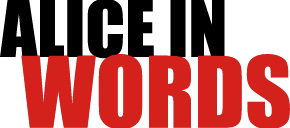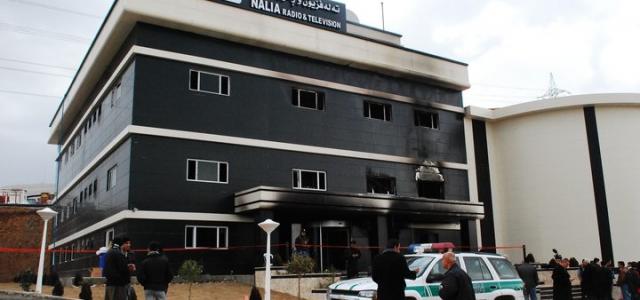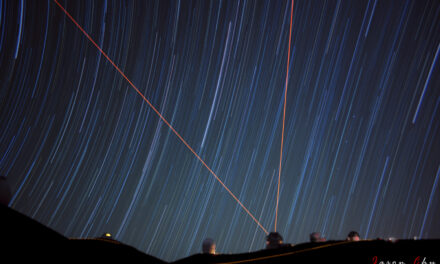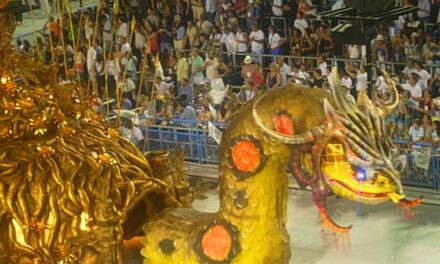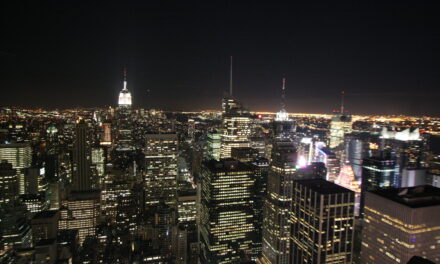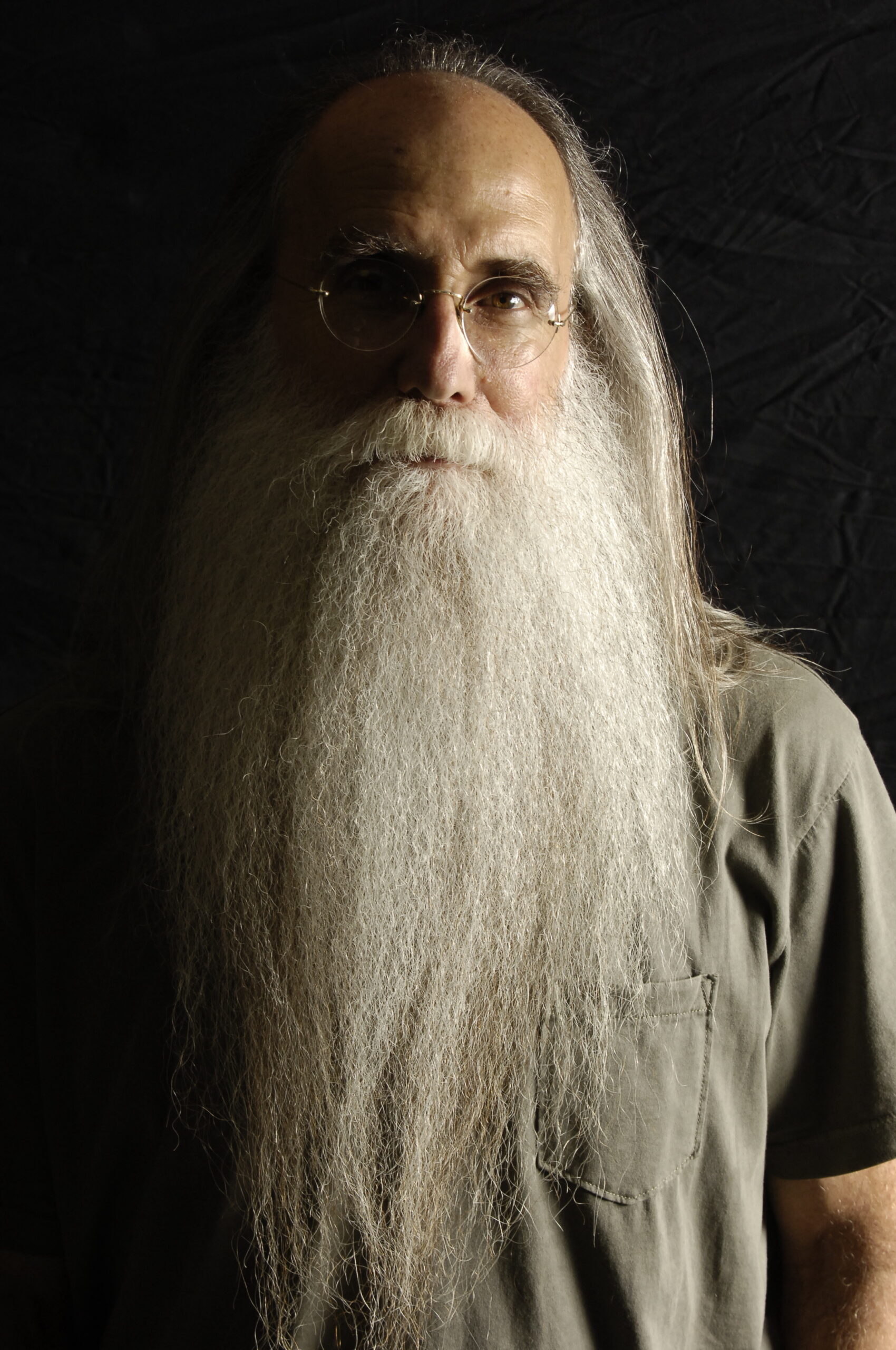Iraq boasts 850 TV and radio stations. But diversity comes at a price. Several media outlets have been attacked in recent months.

The headquarter of Nalia TV in Erbil
Eight years after US-led forces invaded Iraq, the country’s transition to a functioning democracy which grants freedom of press, is far from accomplished. Even in Iraqi Kurdistan, which is sometimes cited as a role model, many journalists are under direct threat. Alice Hlidkova reports from Erbil.
Shaswar Qadir awoke to sirens in the early hours of the morning. As he peeked through his curtain, he witnessed the destruction of the TV and Radio channel that he had co-founded. Across the street, approximately 50 armed men were dousing a three-story building with gasoline and firing shots inside its walls as they set it ablaze. Approaching fire personnel were also targeted, forcing them to abandon the flames until after the shooters had gone.
Within only about 30 minutes, Nalia Radio Television (NRT), a privately-owned and independent satellite network with close to two dozen offices in the Middle east and Europe, had turned into a smoking ruin. After only three days of broadcasting – 15 hours in total – NRT was silenced.
The following morning Qadir made his way through the smoldering debris of burned cameras and television equipment, all of which had been recently acquired. Later that day, Qadir stood in front of a NRT cameraman and reported about what had happened. While he made his broadcast within the burned building, another fire occurred in the capital city of Kurdistan. The Erbil headquarters of the Kurdish News Network (KNN) had been set on fire. They too, along with NRT, had broadcast the shootings from demonstrations three days before.
Protestors from workers and young students to intellectuals first spilled into the streets in the Kurdish city of Sulaymaniyah on February 17th. Initially, they, in thousands came to support the Tunisian people and the Egyptian revolution. But after several people were killed by armed forces of the Kurdish Democratic Party (KDP) and attacked by officials of the Patriotic Union (PUK), the protestors shifted their agenda to protests against corruption within the two dominant parties and families – Barzani (KDP) and Talabani (PUK).
A short-lived euphoria
In the aftermath of the 2003 invasion, Iraq embraced a media boom. Hundreds of new publications, television and radio stations sprung across the country, and Iraqis gained access to satellite dishes and the internet. In Kurdistan, the autonomous region in Northern Iraq, independent media flourished. Within weeks of the invasion, the US-led Coalition Provisional Authority issued Order 14, prohibiting media from inciting “violence against an individual or group”. However, the euphoria over a potentially neutral and free press was short-lived. Many of Iraq’s media outlets have become mouthpieces for religious or political factions.
Violence and civil strife made Iraq the world’s deadliest country for journalists between 2003 and 2008. Even after improvements of security in 2008, extremists and unknown assailants, some linked to political parties, continue to threaten and sometimes kill media workers and torch their offices. In Kurdistan, the situation may be more stable than in other regions of Iraq, but the numbers of attacks remain high for the region which was relatively stable for media workers until 2007. In addition, Kurdistan’s new coalition government that came to power in 2010 continues to deny journalists the right to access information.
Srwa Abdulwahid is used to frequent office visits from government security forces and threatening phone calls. Srwa covers politics for her daily evening report at eight pm for the US-financed TV station Alhurra in Suleymaniyah. For her, the relative freedom of Kurdish journalists depends on their connections. “To get access, you need to establish personal relationships with party members,” she says, but adds that MPs are not required (and sometimes not authorised) by their own parties to talk to press.
For foreign journalists, media consultant Zagros Ahmed Kamal is the man to contact at the Parliament. He readily answers questions, arranges sit-ins on Parliamentary sessions and boasts of the Kurdish media as “most advanced” in comparison with the rest of Iraq.
Local journalists feel neglected
Meanwhile local journalists like Srwa are neglected. They sit in the new media room inside the Parliament, from which they record the hearings. They bring their cameras, mobiles and recorders. On occasion, their equipment is confiscated at the security desk, reports Metro Center to Defend Journalists. When they approach MPs, it is difficult for them to schedule one-on-one meetings as MPs generally don’t trust journalists.
And vice-versa. Journalists have come to mistrust politicians as many attacks on media outlets are said to be ordered by political parties. Srwa and Qadir, for example, hold PUK responsible for the attack on Nalia TV. “We have the names,” Qadir said. “And we want the courts to reach a verdict.” He says weapon parts found in the building point to PUK and quotes some locals who claim to have seen soldiers entering the villa of President Talabani, located 300 meters from NRT.
Prior to the attack on Nalia TV, but after broadcasting the demonstrations, Qadir received threats from PUK officials “We broadcasted since February 17th, soldiers from KDP and PUK were shooting into the crowd and killing demonstrators,” said Qadir, “PUK wanted to hide the truth. They will do everything to keep their system safe.”
A day after the attack, a PUK official called Qadir’s mobile and told him, “Yesterday we burned Nalia TV, today we will burn you.” Qadir stopped broadcasting.
While Qadir argues that the attack on Nalia TV was a political decision made by the PUK, Members of Parliament in Erbil refrain from blaming either party. Some journalists at Nalia TV believe Presidents Barzani and Talabani have made an agreement not to discuss the attack or hold anyone responsible.
“Democracy and free media are at stake”
On March 2nd, Qadir addressed a letter to US president Barack Obama, saying: “We feel abandoned by all. We are being intimidated and continue to receive death threats warning us not to resume broadcast (…) If this event goes without strong international measures, we believe that the future of democracy and free media in Kurdistan region will be in jeopardy.”
The subject was overshadowed by the Arab revolutions and densely packed news agendas of recent months. However, it’s part of a larger story: PUK is not the only Iraqi party trying to hinder free reporting. According to a report published in 2010 by Human Rights Watch, the Iraqi government is generally using the country’s broad criminal and civil libel laws to silence those who criticize members of the government.
While the constitution provides the right to freedom of expression, the penal code authorises fines and imprisonment for those who criticise public authorities. The report stated that President Barzani filed a one billion-dollar defamation lawsuit against a weekly Rozhnama after a July 20, 2010 article accusing KDP of profiting from illegal oil smuggling to Iran.
“Most government officials don’t accept free media” says Qadir. According to the Kurdistan Journalists Syndicate his channel NRT was one of 850 registered TV and radio stations in Iraq. Under Saddam only three stations existed. However, less than a dozen of today’s 850 are considered independent – the rest having affiliations to political parties.
“Either shoot everyone or let us do our job”
Qadir’s critics accuse him of unfair representation of political party opinion, but he believes that NRT had given the political parties of Kurdistan equal voice, interviewing KRG, PUK, Goran, as well as the Islamic opposition and independent academics.
Qadir’s plan is to rebuild his station, despite threats to his life. To him, the government has only two options in dealing with the Iraqi Press: “Either shoot everyone, put them in jail and burn independent media outlets; or, listen to the people, don’t cover up the incident, and let us make our reports.”
Mariwan Hama-Saeed, the Director of the Metro Center, doesn’t see this happening in the near future. He believes Kurdish journalists turn a blind eye on party politics, many fearing corrupt officials who are not brought to justice. Party-backed media, he says, shows a picture of Iraq that is very different from the realities on the ground: “It’s like being in the Caribbean. Everything is nice and green – always sunny, even in the winter.”
